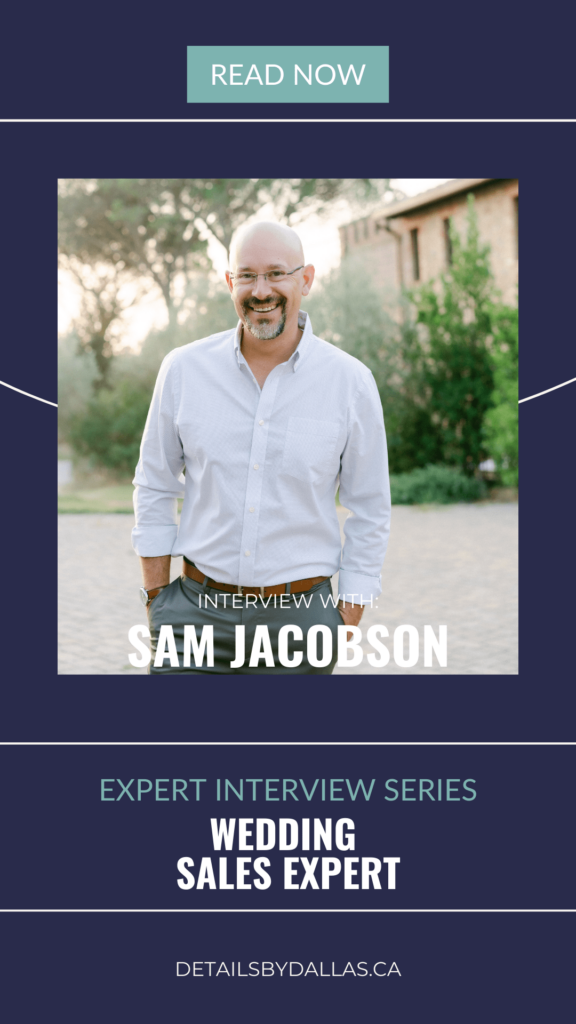When it comes to selling your services as a wedding business, do you ever feel like a hamster runner on a wheel- chasing after the same prize with limited results? Sometimes, the biggest issues in our businesses can be solved with the simplest solutions (and of course some good ol’ fashion hard work). This month I had the absolute honor to sit down with Sam Jacobson of Ideaction Consulting where we discussed everything about wedding sales and selling to your ideal client. Sam explains some key takeaways about understanding who you are selling to and how to make it work for you and your business so that you are seeing results!

Sam Jacobson helps event pros book more couples at higher prices. He uses sales approaches based on behavioral psychology honed over 17 years in the wedding industry. Sam’s led companies in venues, catering, planning, design, décor, and floral, and he’s directly booked hundreds of couples for millions in revenue. Six years ago, Sam founded Ideaction Consulting with his wife, Katy. Since then, their team of eight has worked with hundreds of clients providing business coaching, retreats, online courses and website copywriting.
Wedding Sales Expert Interview
1. What is the best investment (time or money wise) you recommend for a wedding business?
Hire an expert to identify the obstacles for the business. As a coach/consultant, the biggest value I offer clients is not solving the problems, but finding out what’s at issue and needs the most attention. Only when you know what you need to fix is it possible to pick the right way to invest your time and money.
2. What resources do you recommend to help a wedding pro be a better salesperson?
It depends on how you learn best. For readers who want to up their sales game, start with The Science of Selling by David Hoffeld. For people who love podcasts, you should check out my Own Your Business podcast. Start there and get all the free/cheap information you can.
3. What are some of the biggest mistakes you see when it comes to selling in your wedding business?
So many! Sharing detailed pricing and packages too early. Asking for budget in the contact form. Skipping discovery calls. Not scheduling a second call to review the proposal. Generic pricing guides instead of custom proposals. Offering one option plus a la carte services. Relying on planner referrals for luxury-level clients. And 83 other things that come up in the buyer’s journey.
4. What advice do you have for managing inquiries that come from social media?
For DMs specifically, I recommend a text message followed by a <30-second voice memo or video message. Try to get them a “starting at” price in the back-and-forth, and, if it’s a good fit, set up a time to do a proper discovery call.
5. What advice do you have when managing new inquiries when you are too busy to answer them or fully booked out?
New potential business is barely a notch below “on fire right now” with currently booked clients. A solid inquiry response that’s written from scratch on a phone takes 3-5 minutes. If you’re too busy to do that, delete everything on your phone that’s a distraction to get back a few minutes every day to respond to new inquiries.
If you’re working on an event for a day or two, put an autoresponder on your inquiry email that’s interesting and stands out from a typical OOO response, and include a link to a landing page that keeps them interested. Create a personalized response at the next possible opportunity.
6. How do you recommend adjusting the sales process depending on the type of wedding vendor you are?
The sales process I recommend is designed based on the way humans make decisions, so it doesn’t matter what you sell. If it’s a complex purchase like wedding services, it’s a four-touch process:
1) Inquiry response
2) Discovery call
3) Custom proposal
4) Review call
Different vendors may have tweaks here and there, but nothing major.
7. Is there anything vendors can do during the sales process to protect or better prepare your business for scope creep?
Offer three packages with different service levels or components included. If the project scope starts to creep after the contract is signed, remind them what they’re asking for was in a different package and ask if they want to upgrade.
8. When you are in a market full of planners who sell package services how do you sell yourself as a percentage planner? Vice Versa how does a percentage planner sell them self against a package planner.
Percentage pricing v. flat-free pricing is always a hot topic. I recommend planners who are working on a project with an unknown scope charge by percentage of the budget they’re responsible for managing. This is likely the case for anyone doing a destination or tented event, or with a client who is considering either of these as options. Also, large décor and entertainment scopes can be lumped into this criteria.
Flat-rate fees are best for projects with fixed scopes. However, you can always include a clause in your contract that lays out what happens if the scope (and budget) go up significantly. In this case, charge a percentage of what goes over the scope.
It’s possible to sell for and against percentage-based pricing OR fixed-rate fees, but the nuances and tactics require a longer discussion.
10. What advice do you have for planners who want to be labeled as a “destination wedding planner’ but don’t have past destination weddings to speak to during the sales process?
Make yourself an expert in the area. Create content in that location. Reach out to local vendors. Be patient. And don’t be choosy about your first project – take the opportunity if it’s there.
11. What advice do you have about pre-qualifying clients?
Don’t overqualify potential clients. Remember, the super majority of couples who inquire have never done this before. They’re learning…how to do it and how much things cost and what they want. Your job is to guide them through the buying experience.
Don’t ask about the budget too early – they don’t know. Or they’ll low-ball you, because they think you’ve started negotiating already.
The simple fact about sales is the more you talk to potential buyers the more likely they are to buy something from you. Obviously, you can’t talk with everyone who inquires, especially if you’re at the top of the market, but I’d err on the side of doing more discovery calls instead of pre-judging inquiries.
My recommendation is to list your “starting at” price on your Contact page (not form), and/or include in your initial inquiry response. If they see that and still want to talk, set up the call.
How Sam Can Help You And Your Wedding Business
Sam is filled with immense knowledge of the wedding industry and can be found on the stage speaking at many industry events. New episodes are released every week on the Own Your Business podcast and golden nuggets of information can be sent directly to your inbox via his newsletter. I highly recommend checking out both items if you haven’t done so already- I swear by Sam’s podcast it is the best out there for wedding professionals!
I strongly recommend you reach out to him and his team for help with your wedding business. Sam offers a variety of consulting, training and copywriting services. Be sure to check out his website for more information on how he can help you! As an added bonus Sam is offering 50% OFF website audit services, so be sure to book yours today!
I hope you have walked away from today’s interview with a better understanding of how to approach selling your wedding services to your ideal clients. Be sure to give Sam a follow on social media for more great email tips! Be sure to check out our BONUS interview with Sam Jacobson on the Details By Dallas Instagram page!

